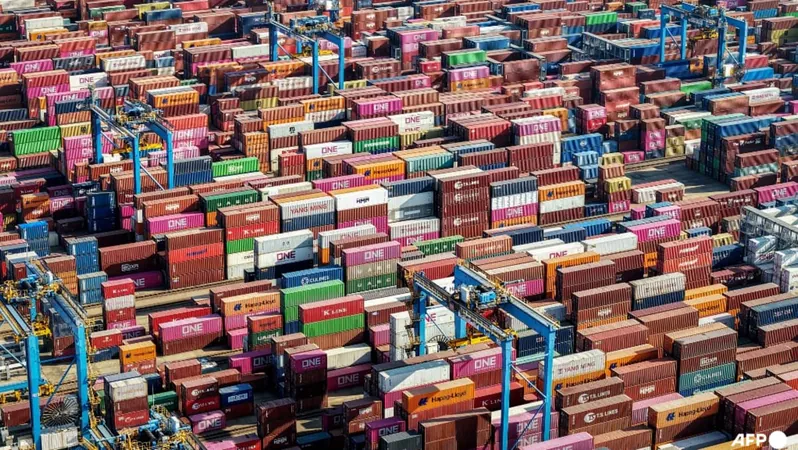
Beijing Accuses EU of Unfair Trade Practices Amid Rising Tensions
2025-01-09
Author: Arjun
In an escalating diplomatic spat, China on Thursday (Jan 9) accused the European Union (EU) of imposing unfair "trade and investment barriers" that hinder Chinese firms' operations within Europe. This accusation follows an intense investigation that commenced in July when the EU began probing potential Chinese government subsidies undermining competition on the continent.
China’s Commerce Ministry has firmly denied any wrongdoing, claiming that its industrial policies are not unfair. Officials have threatened to retaliate, defending the legal rights and interests of Chinese companies amidst growing animosity toward EU regulations.
The core of the dispute revolves around the EU's controversial Foreign Subsidies Regulation (FSR), which Beijing asserts discriminates against its firms. While China has not disclosed specific retaliatory actions it might take, the ministry condemned the FSR, alleging it creates trade barriers detrimental to Chinese businesses.
The tension is compounded by the fact that China and the EU are significant trading partners. Recent EU actions have intensified, particularly as Brussels attempts to focus on renewable energy initiatives to achieve its ambitious net-zero emissions goal by 2050. This push includes moving away from what EU officials consider excessive dependence on Chinese technology, which has been increasingly framed as a national security concern by many Western governments.
Beijing's National Chamber of Commerce for Importing and Exporting Machinery and Electronics filed a complaint against the FSR measures. According to a detailed report by the ministry, the investigation revealed that the FSR's enforcement is “selective,” resulting in Chinese products receiving less favorable treatment compared to those from non-Chinese competitors.
The ministry criticized the FSR for having "vague" investigation criteria, creating a "severe burden" on Chinese companies, and subjecting them to uncertain and opaque procedures. Furthermore, it highlighted the challenges posed by unexpected inspections, noting that EU investigators could be "subjective and arbitrary" in their evaluations of market distortion issues.
The ramifications have been significant, with reports indicating that FSR investigations led Chinese companies to withdraw or scale back projects, incurring losses exceeding 15 billion yuan (around US$2.05 billion). The ministry pointed out that these measures not only crippled the competitiveness of Chinese products in the EU but also stifled economic growth within European nations and strained trade relations between Beijing and Brussels.
Interestingly, this trade-related tension is further illustrated by specific EU actions. The EU's initial probe under the FSR targeted a subsidiary of the Chinese rail giant CRRC, which subsequently withdrew from a Bulgarian tender for electric train supply. Additionally, another ongoing investigation involves Chinese solar panel manufacturers intending to create a photovoltaic park in Romania with partial European funding.
In a related development last October, the EU imposed extra tariffs on Chinese-made electric vehicles, stating that unfair state support from Beijing was damaging to European carmakers. In retaliation, China announced provisional tariffs on European brandy and has even expanded its investigation into that arena, citing the "complexity" of the case.
Amid these growing tensions, the European Union Chamber of Commerce in China released a sobering report. It revealed that businesses are being coerced into overly localized operations to comply with China's regulations, which inflates costs and hampers efficiency. The increasing focus on national security has led many multinationals to separate their operations in China from those elsewhere, thereby diminishing their global cohesion.
Consequently, many clients are adopting a cautious approach, often opting not to engage with foreign service providers, as highlighted by Chamber head Jens Eskelund during a recent media event. This trend underscores the profound implications of the trade standoff, which could reshape the future landscape of international commerce between these two economic powerhouses.
As tensions persist, it remains to be seen how both sides will navigate these turbulent waters and whether a resolution can be reached that ensures fair trade practices for all involved.

 Brasil (PT)
Brasil (PT)
 Canada (EN)
Canada (EN)
 Chile (ES)
Chile (ES)
 Česko (CS)
Česko (CS)
 대한민국 (KO)
대한민국 (KO)
 España (ES)
España (ES)
 France (FR)
France (FR)
 Hong Kong (EN)
Hong Kong (EN)
 Italia (IT)
Italia (IT)
 日本 (JA)
日本 (JA)
 Magyarország (HU)
Magyarország (HU)
 Norge (NO)
Norge (NO)
 Polska (PL)
Polska (PL)
 Schweiz (DE)
Schweiz (DE)
 Singapore (EN)
Singapore (EN)
 Sverige (SV)
Sverige (SV)
 Suomi (FI)
Suomi (FI)
 Türkiye (TR)
Türkiye (TR)
 الإمارات العربية المتحدة (AR)
الإمارات العربية المتحدة (AR)